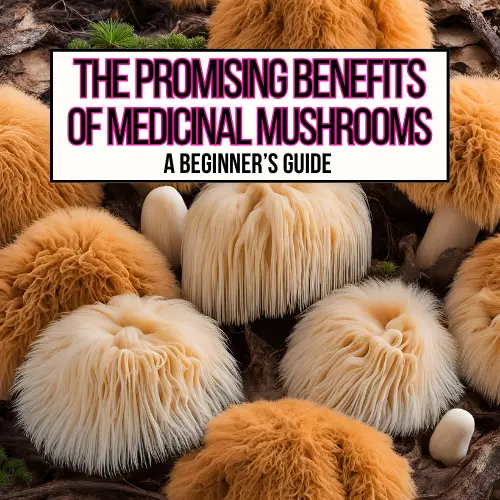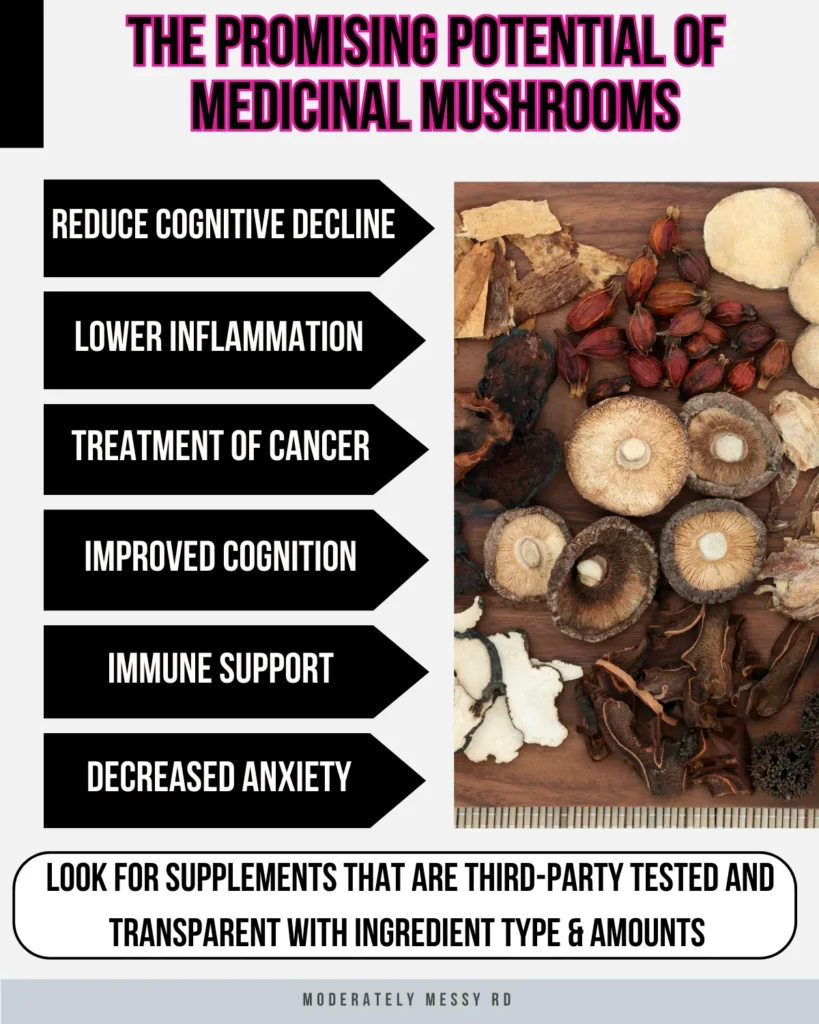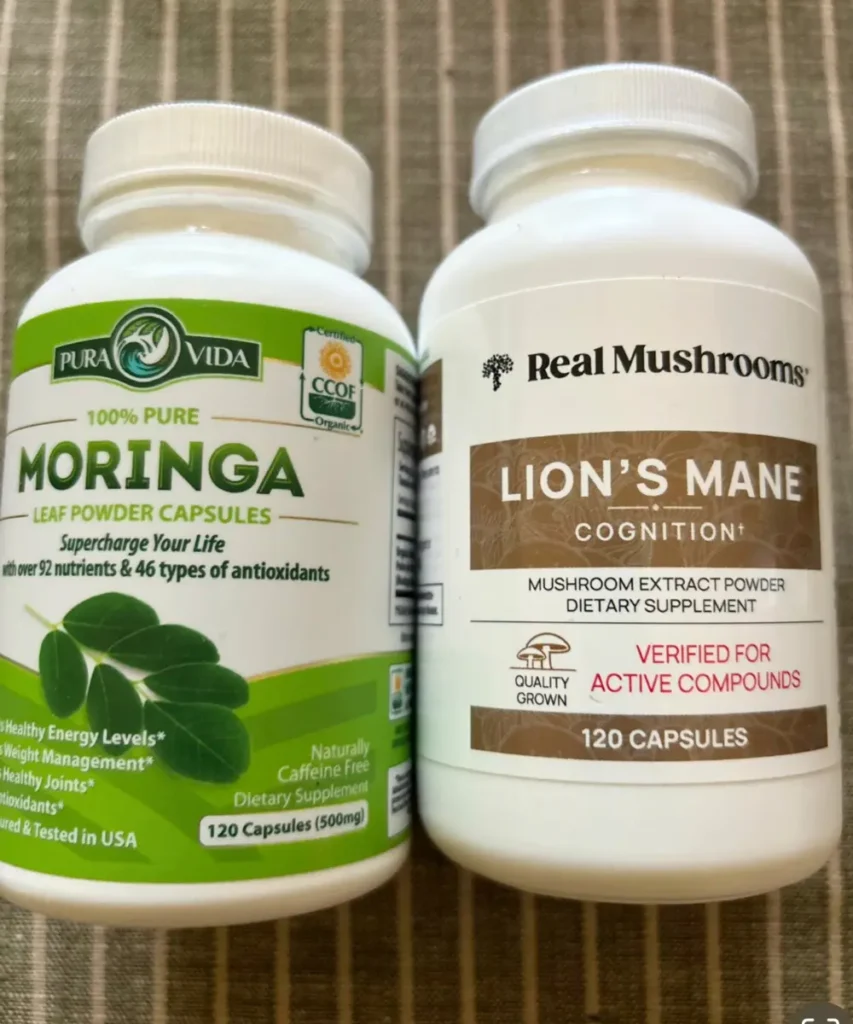I’ve been noticing more and more posts on social media raving about medicinal mushrooms – with claims that they can improve gut health, hormonal imbalances, immunity, cancer, memory and reduce cognitive decline. If you’ve been curious about this as well, here’s everything you need to know about these functional mushrooms and their potential benefits.

Medicinal mushrooms have been used in Chinese medicine for years, however, have only recently been a popular area of interest in clinical research. To be as transparent as possible: scientists have identified some very promising benefits from medicinal mushrooms. However, these benefits are primarily found in animal studies – with very few studies conducted on humans!
I have tried to answer all of the questions that I would have before buying functional mushroom supplements. Are they worth the money? Here’s what you need to know so you can make your own informed decision when it comes to these products.
What are MEdicinal Mushrooms?
All mushrooms have medicinal properties, and can therefore be considered functional or “medicinal mushrooms”. Not to be confused with psychedelic mushrooms, they’re classified as “fungi” and a good source of protein, fiber, antioxidants and several B vitamins.
Mushrooms have been used to promote physical well-being and the treatment of numerous diseases since ancient times, primarily in Asian regions. More recently, though, they have been used in complementary alternative medicine in the form of dietary supplements – primarily to treat and prevent cancer.
Medicinal mushrooms may have antimicrobial, anti-inflammatory, immunomodulatory, antidiabetic, cytotoxic, antioxidant, hepatoprotective, anticancer, antioxidant, antiallergic, antihyperlipidemic, and prebiotic properties. Some experts state they may provide over 200 different medicinal functions!
These properties are due to secondary compounds and metabolites present in the fruiting body (the stem and the cap) as well as the mycelium. They’re also said to be packed with prebiotics and can improve the diversity of our gut bacteria and reduce inflammation of the gut.
These potential benefits are dependent on the type of fungus. Therefore, different types of medicinal mushrooms may have specific benefits. A very small amount of clinical studies have been carried out on humans and further studies are necessary to assess the safety and efficacy of medicinal mushrooms.

Types of Medicinal Mushrooms
There are numerous types of medicinal mushrooms, but I’ve chosen 5 of the most popular to discuss and what distinguishes them from other types. This area of research is complex and not completely understood. Take this with a grain of salt because as more and more research becomes available, more benefits may be unraveled!
Chaga (Inonotus obliquus)
Chaga is best known for its’ antioxidant and immune-boosting properties. Various bioactive compounds in Chaga are thought to be helpful in treating gastrointestinal cancer, diabetes and bacterial infections – among many other benefits.
Lion’s Mane (Hericium erinaceus)
Lion’s mane is often referred to as the “smart mushroom” as it may support brain health and cognitive function. Some studies suggest that lion’s mane can even regenerate new brain cells. Its’ most frequent use is for the treatment of neurodegenerative disease and cognitive impairment.
Lion’s mane has promising potential to help reduce cognitive decline (like dementia and Alzheimer’s) as well as symptoms of depression and anxiety. Even further, it may promote the growth of beneficial gut bacteria, reduce inflammation in the GI tract. and even improve sleep quality.
Turkey Tail (Coriolus versicolor)
Turkey tail is most well-known for the role it may play in the treatment of cancer. In China, there are actually C. versicolor-based drugs that are approved for clinical use. It is the most studied type of mushroom but there is still much to be understood regarding how it actually works.
It is rich in prebiotics, which help to feed the “good bacteria” in our gut. This can lead to a more diverse and resilient gut microbiome.
Reishi (Ganoderma lucidum)
Reishi has been used in Chinese medicine for centuries to promote overall well-being and mental clarity. Studies have found it has strong anti-inflammatory and immune-boosting properties. Most recently, there is an increased focus on the use of Reishi in treating metabolic disorders such as diabetes and obesity, as well as its possible role in preventing and treating infections caused by the coronavirus.
Cordyceps (Cordyceps militaris)
Cordyceps is most popularly known as an “energy booster”, with the potential to improve aerobic performance by increasing oxygen uptake. Studies have shown it may also reduce cholesterol and improve immune, cardiovascular, kidney and liver function. It has also been used as an anti-cancer agent.
What You Should know About Mushroom Products

The market is expected to explode with products containing mushrooms, however, medicinal mushrooms shouldn’t be used as a replacement for modern medicine. As with any dietary supplement, increased knowledge and awareness will likely provide the best results.
Types of Dietary Supplements
There are a wide variety of medicinal mushroom supplements on the market, from fruit body powders to fruit body extracts and other supplements which may consist of mushroom spores or mycellium. Some supplements contain just one single mushroom variety, while others have a blend or combination.
Mushroom extracts made primarily from fruiting bodies offer a greater concentration of these potentially beneficial compounds.
What I don’t recommend are mushroom coffees or beverages that likely don’t contain a therapeutic dosage. They don’t taste very good, and most of these companies are not transparent about the ingredients or quantities in them. Don’t waste your money, unless from a reputable company!
How to Choose a Medicinal Mushroom Supplement
First and foremost, do your research. Figure out which type of mushroom would be most beneficial for you. The lack of regulation and monitoring of the supplement industry makes it very difficult to really trust what you are actually buying.
Here are some other things to consider:
After a quick review, I could only find two companies I would recommend:
Eversio Wellness: Third-party tested, transparent, good reviews.
Free Mushrooms: Third-party tested, good reviews, somewhat transparent.
Potential Risks of Medicinal Mushroom Supplements
If you are taking any medications, it’s important to discuss with your physician in case there are any interactions with the product you want to buy. Medicinal mushrooms may not be recommended for those with specific disease conditions.
There are many reported side effects such as nausea, GI upset, dizziness, skin rashes, and dry mouth.
There are not currently any standardized recommended dosages, active ingredients, or even full understanding of the mechanisms of action for medicinal mushrooms. Dosage may vary depending on the type of mushroom and the product’s concentration. This makes it hard to recommend these dietary supplements as there are just so many limitations. SO many questions!
However, there are so many promising benefits! I anticipate more and more research to come out, which will help consumers make the best informed choices and hopefully improve the quality of dietary supplements on the market.
What is the Best Time to Take Medicinal Mushrooms?
I don’t think there is an expert recommendation on timing, it might depend on what you’re using it for. Some people take lion’s mane to improve their quality of sleep, and therefore, consume it right before bedtime. Others use it for attention span and cognition, and take it in the morning.
What Consumers Are SaYing
I decided to search Reddit and Amazon for actual claims from people who have been taking medicinal mushrooms. Many people complain that they don’t taste very good! That being said, the most common reported benefit was improved mood and less brain fog.
I have specifically seen very good reviews on lion’s mane supplements, with many reporting less anxiety, increased focus and mental clarity. It’s very interesting! Out of curiosity, I might have to try it.
Have you tried a medicinal mushroom supplement? What are your thoughts?
Also Read:
— All About Ashwagandha Supplements
— Functional Beverages: Trendy or Worth the Hype?
